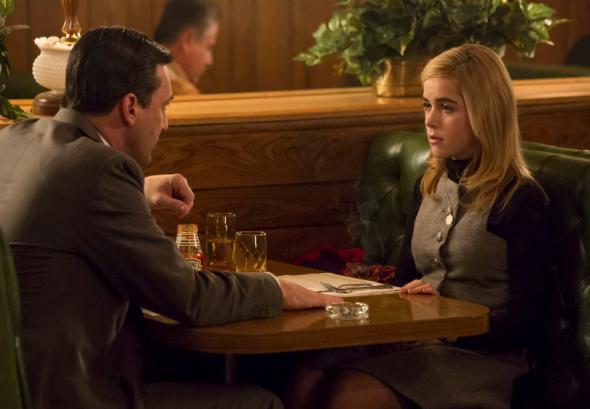Willa,
You’re right that Sunday night’s episode showed how office life in 1969 was a seesaw ride for the women—but it’s up and down for the men as well. Both Pete and Don are disoriented by the way the changes of the ’60s have rewritten the rules. For Pete, that weaselly climber, being banished to the West Coast—where there’s no established hierarchy, no ladder to scale—leaves him confused and purposeless. “What am I working for here?” he asks Ted. “There’s two offices. Yours is only slightly better than mine. What am I supposed to do, work my way up to your office?” When Ted responds by offering to swap desks, it only enrages Pete further. Because he comes from money, he’s always worked for status, approval, acclaim, the next benchmark of success. But out on the frontier, as his girlfriend’s Mamet-worthy ode to selling suggests, nobody is keeping track of who you are or what you’re owed. Everyone’s just a prospector, panning for the next fortune.
And Don, once he and Sally finally warm up to each other enough to have a real conversation in that gas-station diner, reveals how he miscalculated the changing mores of the era as well. For years now, Mad Men has tracked a tamped-down, repressed ’50s America becoming one where people let it all hang out. Don has had to learn—sometimes painfully slowly—that being honest with himself, his bosses, his wives, and, at the end of last season, his children may actually be preferable to crafting pitch after idealized pitch for the product that is himself. But in that Hershey’s meeting, fueled by booze and frustration, he took this idea a notch too far. “I said the wrong thing to the wrong people at the wrong time,” he tells Sally. (No wonder Ogilvy snagged the account.)
What’s confusing for everyone here is the conflict between telling the truth and maintaining appearances. The episode is called “A Day’s Work,” and in it Dawn tells Shirley: “Keep pretending. That’s your job.” Sally’s job, as she understands it, is to play a cool, callow teen, the sort who can agree that a trip to a funeral is “worth it” because it enabled a city jaunt (to the head shop, a coffee shop, and a boutique for “Pocahontas boots,” it sounds like). When she explains this to Don, though—“I only went so I could go shopping”—he calls her on the charade: “I doubt that.”
Over that patty melt—and I love how Don’s face relaxes when Sally reaches for the ketchup bottle, signaling that she’s going to relent, eat, be his daughter, be his girl—Don and Sally both see through each other, and also take pleasure in being truly seen. “I’m so many people,” Sally laments, thinking both of the heartless schoolgirl and the distant daughter she’s been playing. (“I’d stay here till 1975 if I could get Betty in the ground,” she says to her pals early in the episode, expertly inhabiting both.) Meanwhile, she prods Don about the fantasy he’s maintaining with Megan: “Why don’t you just tell her that you don’t want to move to California?” Which may be what forces him to realize, I think, that he doesn’t.
Their honesty then allows for pretense as a game—Don jokingly suggests they skip out on the check, teasing her with the suggestion that he is too broke to afford cold roadside fries, before pulling out his billfold with a reassuring smile—and leads to the episode’s heart-twanging conclusion: Like Don, I teared up when Sally said, “I love you.”* But the question Sally raises earlier on—whether it’s more embarrassing to lie or be caught in a lie—remains unanswered. How honest one should be depends on where you are, and when, and who you are talking to.
Seth, I’m curious to hear what you made of Don in the opening sequence—waking past noon? Penciling the level of the Canadian Club?—but before I go, I want to talk about Dawn and Joan’s promotions. I agree, Willa, that Dawn’s smile was one of the show’s best moments ever—and I’m heartened that this year Dawn will have her own concerns, and not just be a foil for the racial awakening of other people. It also seemed in keeping with Mad Men’s realpolitik take on how social progress is made that her promotion came not because right-thinking people were marching open-mindedly toward the future, but in some sense accidentally and because of Cooper’s racism. Dawn has the right qualities for the job, but if Cooper hadn’t been so retrograde, she might still be stuck out front.
As for Joan: I loved seeing Cutler recognize her talents and her dual role. (I hadn’t noticed till this episode that the two doors on her office bear two different placards: one says “Joan Harris,” the other simply “Traffic.” Guess which one Peggy used?) Watching her strut upstairs with her chin aloft, I was thrilled. But rewatching the episode, I realized: Cutler, the guy even Pete calls Machiavelli, isn’t just being nice. He’s buying Joan’s loyalty. “I’d hate to think of you as an adversary,” Jim tells Roger—but he already does. We’ll see how it all plays out on next week’s botched conference call.
They never said which of Peggy’s accounts we lost,
Read all of Slate’s coverage of Mad Men.
Correction, April 21, 2014: This entry originally miquoted Sally, who said, “I love you,” not, “I love you, Dad.” (Return.)
